|
|
|
Sort Order |
|
|
|
Items / Page
|
|
|
|
|
|
|
| Srl | Item |
| 1 |
ID:
190118
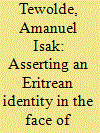

|
|
|
|
|
| Summary/Abstract |
Current literature on Eritrean national identity has been dominated by debates on its function as a unifying and homogenising civic identity in a context of a multi-ethnic, multi-religious and multi-clan national context. Little is known, however, about how an Eritrean national identity is mobilised among Eritreans living in racially organised host societies. This paper addresses this lacuna by examining how Eritrean refugees living in a racially classified South African host society self-identified. The focus of analysis for this paper was how an Eritrean national identity was mobilised by some participants in the face of experiencing racial classification. Some individuals defined themselves as ‘Eritrean’ to resist their classification as ‘Black’ in everyday life. I argue that beyond functioning as a homogenising and unifying civic identity, an Eritrean national identity functioned as a bulwark against ascribed racial classification in a race-conscious South African host society,
|
|
|
|
|
|
|
|
|
|
|
|
|
|
|
|
| 2 |
ID:
174597
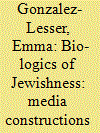

|
|
|
|
|
| Summary/Abstract |
The specific ethno-racial position of Jewishness offers an ideal case study for contemporary U.S. racialisation processes. Despite a proclaimed end to biologisation in a supposed ‘post-racial’ era, essentialist reasoning remains central to U.S. race-making. Employing a content analysis of the New York Times and the Los Angeles Times (2000–2010), I find that biologically rooted constructions of Jewishness occur through appeals to (1) physical definitions based on DNA or phenotype, and (2) subtle biologisation vis-à-vis ancestral claims. Demonstrating both explicit and subtle biologisation expands social scientists’ understanding of race, ethnicity, and Jewish identities.
|
|
|
|
|
|
|
|
|
|
|
|
|
|
|
|
| 3 |
ID:
187070


|
|
|
|
|
| Summary/Abstract |
In this paper, we problematise the relationship between racism and immigrant integration policies. First, we approach racism from its geopolitical/institutional/governmental logic and contextualise the emergence of integration policies across the European Union. Then, we put into dialogue the fieldwork materials of our research projects, analysing intersections between the EU and Spanish integration policy frameworks. Despite the inclusive and proactive rhetoric often expressed by integration policies, we illustrate the existence of an ‘elective affinity’ between racism and integration by focusing on: (1) the construction of migrants as a problematic ‘object’ of governmental intervention; (2) the reduction of racism to an individual pathology and the underestimation of its institutional/structural dimensions; (3) the reproduction of epistemic racism through the discourse on European (and national) values.
|
|
|
|
|
|
|
|
|
|
|
|
|
|
|
|
| 4 |
ID:
089195
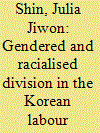

|
|
|
|
|
| Publication |
2009.
|
| Summary/Abstract |
Based on the empirical analysis of migrant women employed in the catering sector, this paper examines the gendered and racialised division in the Korean labour market. Given limited labour protection and the flexibilisation of the migrant workforce in the labour market, South Korea has been able to reduce possible economic and social costs and, at the same time, enjoy the benefits of the significant economic contribution of migrant workers. By looking at gender relations and racial discrimination in the catering sector, and inconsistent government policies, this paper underlines that migrant women are marginalised in the labour market owing to their 'multiple vulnerability' as women, migrants and undocumented workers.
|
|
|
|
|
|
|
|
|
|
|
|
|
|
|
|
| 5 |
ID:
182471
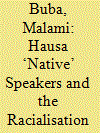

|
|
|
|
|
| Summary/Abstract |
The colonial encounter between the Hausa and the British produced multiple layers of experiences both for the coloniser and the colonised. In addition to its violent history of conquest and domination, it created a ‘text’ of learning through which ideas of ‘mixing truth with falsehood’ were presented, localised and propagated as counterweight to the dominant Muslim epistemology. Mediating and navigating these spaces require deeper understanding and the skilful weaving of divergent epistemologies of the world. In this article, the role of the ‘native speaker’ as a cultural broker is explored.
|
|
|
|
|
|
|
|
|
|
|
|
|
|
|
|
| 6 |
ID:
176018
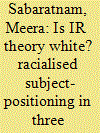

|
|
|
|
|
| Summary/Abstract |
Racism is a historically specific structure of modern global power which generates hierarchies of the human and affirms White supremacy. This has far-reaching material and epistemological consequences in the present, one of which is the production and naturalisation of White-racialised subject positions in academic discourse. This article develops a framework for analysing Whiteness through subject-positioning, synthesising insights from critical race scholarship that seek to dismantle its epistemological tendencies. This framework identifies White subject-positioning as patterned by interlocking epistemologies of immanence, ignorance, and innocence. The article then interrogates how these epistemological tendencies produce limitations and contradictions in international theory through an analysis of three seminal and canonical texts: Kenneth Waltz’s Theory of International Politics (1979), Robert Keohane’s After Hegemony (1984) and Alexander Wendt’s Social Theory of International Politics (1999). It shows that these epistemologies produce contradictions and weaknesses within the texts by systematically severing the analysis of the international system and the ‘West’ from its actual imperial conditions of possibility. The article outlines pathways for overcoming these limitations and suggests that continued inattention to the epistemological consequences of race for International Relations (IR) theory is intellectually unsustainable.
|
|
|
|
|
|
|
|
|
|
|
|
|
|
|
|
| 7 |
ID:
167645


|
|
|
|
|
| Summary/Abstract |
This paper examines public discourse on race, whiteness and Muslims through an in-depth exploration of an online media controversy following the 2013 Boston Marathon bombings. On 16 April, the day after the attacks, the liberal magazine Salon.com published David Sirota’s article, ‘Let’s Hope the Boston Marathon Bomber is a White American’. A firestorm of commentary followed, with conservatives defending the profiling of Muslims, and accusing Sirota of anti-white racism. Anchored in questions of race, racism and Muslims and marked by a sharp partisan polarisation, these discussions intensified after 18 April, when the Tsarnaev brothers were identified as the perpetrators. The ensuing debate surrounding the racial identity of the Tsarnaevs displays how Muslim racialisation occurs and operates within a conservative discourse strongly committed to a colour-blind ideology. Our paper moves beyond this affirmation of literature on Muslim racialisation and sets this process within a relationally constructed and performative white racial identity.
|
|
|
|
|
|
|
|
|
|
|
|
|
|
|
|
| 8 |
ID:
148287
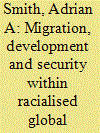

|
|
|
|
|
| Summary/Abstract |
Within international labour migration, received wisdom holds that the migration-development and migration-security couplings co-exist in discord. The migration-development-security relationship is perceived to swing like a pendulum. In this article I reject the simple pendulum formulation which suggests security stands at odds with development. I examine the ways in which migration controls occur through and reproduce racialised global capitalism. Capitalist development and security work together to undermine the resistance struggles of those designated migrant labour. Students of labour migration must refuse the game of balance and instead entrench our analytical efforts within the creative self-activities of ordinary working people.
|
|
|
|
|
|
|
|
|
|
|
|
|
|
|
|
| 9 |
ID:
153669
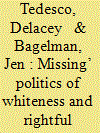

|
|
|
|
|
| Summary/Abstract |
This article engages the global nexus of colonisation, racialisation, and urbanisation through the settler colonial city of Kelowna, British Columbia (BC), Canada. Kelowna is known for its recent, rapid urbanisation and for its ongoing, disproportionate ‘whiteness’, understood as a complex political geography that enacts boundaries of inclusion and exclusion. The white urban identity of Kelowna defines Indigenous and temporary migrant communities as ‘missing’ or ‘out-of-place’, yet these configurations of ‘missing’ are politically contested. This article examines how differential processes of racialisation and urbanisation establish the whiteness of this settler-colonial city, drawing attention to ways that ‘missing’ communities remake relations of ‘rightful presence’ in the city, against dominant racialised, colonial, and urban narratives of their absence and processes of their displacement. Finally, this article considers how a politics of ‘rightful presence’ needs to be reconfigured in the settler-colonial city, which itself has no rightful presence on unceded Indigenous land.
|
|
|
|
|
|
|
|
|
|
|
|
|
|
|
|
| 10 |
ID:
123919
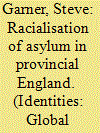

|
|
|
|
|
| Publication |
2013.
|
| Summary/Abstract |
This article examines the discursive racialisation of asylum-seekers by residents of Portishead, a small English town, a process demonstrating a classed and placed set of expressions of whiteness. I study the racialisation of a diverse group of people from the bottom-up, through an analysis of residents' letters of objection to the Government's request for planning permission to turn a building into an asylum processing centre in 2004. Three registers of language are presented: 'technocratic', 'resentful' and 'conjectural'. Racialisation is expressed through shared ideas about the type of space in Portishead, and the type of people appropriate for it. The space is constructed as white and middle-class: the asylum-seekers are produced discursively as neither and therefore as not belonging. I suggest that the phenomenon of relatively powerful groups constructing themselves as weak and beleaguered can be conceptualised as a form of 'defensive engagement'.
|
|
|
|
|
|
|
|
|
|
|
|
|
|
|
|
| 11 |
ID:
188407


|
|
|
|
|
| Summary/Abstract |
This paper reveals the racialisation of India’s post-colonial citizenship regime by following the history of the National Register of Citizens (NRC) in Assam. Assam’s NRC shows how political elites at both the subnational and national level have excluded minority populations through multivalent racialised nationalist imaginations. I show how racialisation is an important analytic to understand how ethnic, linguistic and religious groups are essentialised in relation to one another, and I contend that citizenship is embedded within these historical and social processes. I conclude that challenging the NRC must go beyond critiquing the process as a bureaucratic nightmare to contend with borders that entrench exclusionary ideas of citizenship towards imagining emancipatory futures.
|
|
|
|
|
|
|
|
|
|
|
|
|
|
|
|
| 12 |
ID:
157077
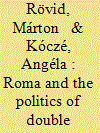

|
|
|
|
|
| Summary/Abstract |
The article analyses the politics of ‘double discourse’ in relation to Roma that has evolved in contemporary neoliberal Europe. On the one hand, the double discourse promotes the integration, rights and equal opportunities of Roma, on the other, it denies recognition of, and ways to address, enduring structural violence and rising social insecurity. The article argues that the politics of ‘double discourse’, as a neoliberal approach towards Roma, is structured by two contradictory discourses that speak to different audiences, using duplicitous approaches to create anti-Roma consensus and maintain the critical difference and subordinated position of the racialised Romani populations in Europe. By studying the representation of Roma in the cases of so-called 'child theft' in Greece and Ireland, and in the recent ‘refugee crisis’, the paper identifies and discusses three dimensions of contemporary neoliberal double discourse: racialised de-Europeanisation, neoliberal undeservingness and (dis)articulation of citizenship.
|
|
|
|
|
|
|
|
|
|
|
|
|
|
|
|
| 13 |
ID:
157872


|
|
|
|
|
| Summary/Abstract |
Using Said's contrapuntal analysis, this paper places Prashad's Uncle Swami: South Asians in America Today (2012) in a dialectic with Said's Orientalism (1978) to explore contemporary conceptualisations, racialisations and positionings of South Asians in the United States. The investigation specifies the enduring and expanding nature of Orientalisms, using Marxist political economy analyses and post-colonial positionings to gain insights into the specifically hybridised identities of South Asians in America. It links the expansion of Orientalisms to contemporary US imperial projects with South Asians’ conceptualisations and racialisations located within the amalgam of expanding global capitalism and narratives of security.
|
|
|
|
|
|
|
|
|
|
|
|
|
|
|
|
| 14 |
ID:
152445


|
|
|
|
|
| Summary/Abstract |
In this article I assert that the importance of names within the process of racialisation has been under-explored in the UK context. I consider data from seven qualitative interviews, which suggest that names are racialised in the UK and that this racialisation can affect the naming choices of multiracial/ethnic parents. My participants indicated that, when choosing children’s forenames and surnames, there are juxtaposing concerns: a fear of potential discrimination faced by children on the basis of them bearing a ‘foreign’ name, and a desire to reflect the children’s multiracial and/or ethnic heritage. I describe and discuss two consequential strategies that my participants suggested: to give the child a white British name in an attempt to help them pass as white British, or to oppose the fears of racism/discrimination and give them a name that displays their Otherness. I discuss these ideas in relation to racial passing and whiteness literature.
|
|
|
|
|
|
|
|
|
|
|
|
|
|
|
|
|
|
|
|
|